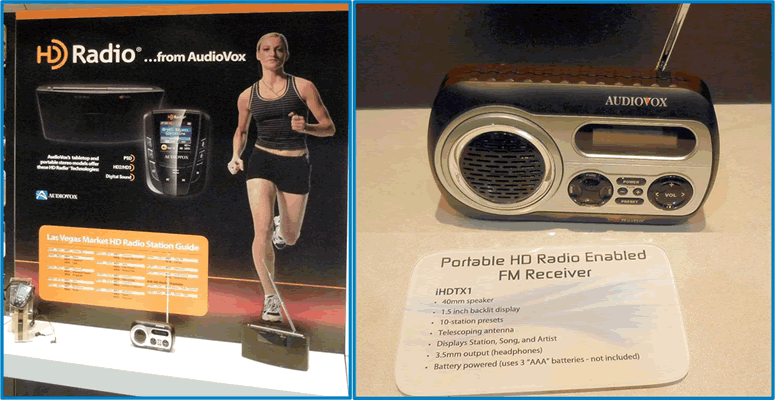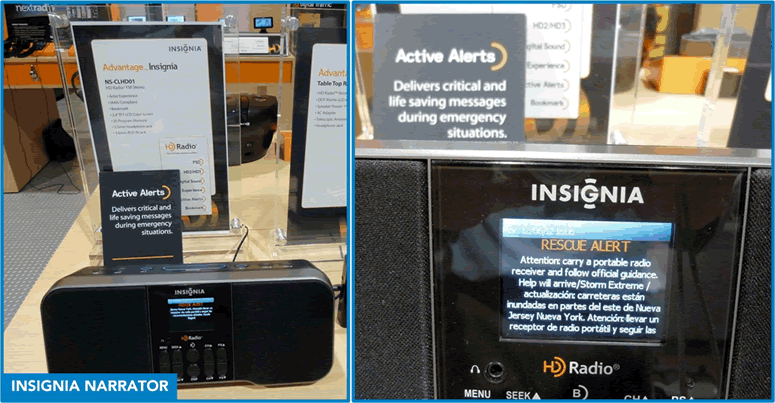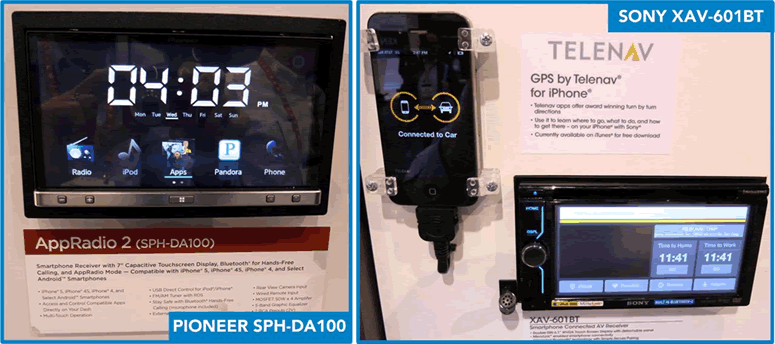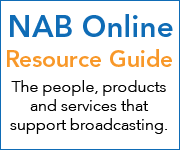|
|

|
NextRadio Unveiled at 2013 International CES
There were myriad announcements and unveilings last week at the 2013 International Consumer Electronics Show (CES, January 8-11, 2013, Las Vegas, Nev.), but arguably the most important for the radio industry was the announcement by Sprint regarding increased availability of over-the-air radio capability in Sprint smart phones. Given below is a summary of this and other key developments at this year's show. NextRadio unveiled - on the first day of the 2013 International CES, Sprint announced a preliminary arrangement with representatives of the U.S. radio industry that will enable Sprint customers to listen to local FM radio stations from a broad spectrum of radio companies and aggregators on select Android and Windows smart phones during the next three years. FM radio could be delivered through the NextRadio tuner application (see below) or other radio apps or services. This announcement marks the first time a U.S. wireless carrier will offer the ability to access local FM radio on a broad array of its devices. Consumers today can listen to many radio stations on smart phones by streaming over the Internet (using bytes from their data plan). Going forward, Sprint customers will be able to use their smart phones and the NextRadio tuner to listen to local FM radio stations using the broadcast FM signal, which will not impact data usage. With
the NextRadio tuner - expected to be available later in 2013 - Sprint
customers would enjoy a wide range of interactive listener features
not available today and would have the availability of local FM
radio at their fingertips to access all forms of broadcast information.
Paul Brenner, SVP and CTO of Emmis Communications (in photo below),
was demonstrating the prototype NextRadio app in the HD Radio exhibit
at the show. Paul was showing this app running on two different devices - a Samsung Galaxy S running Android, and a Nokia Lumia 900 running Windows 7.5. A predecessor to this app was developed by Emmis for NAB Labs in 2012 as part of the "HD Radio in Smartphone" project unveiled at the 2012 NAB Show (see the April 23, 2012 issue of Radio TechCheck for additional information). NAB President Gordon Smith, in commenting on this groundbreaking development, said, "This opportunity combines the strengths of the Sprint network with the impact of America's radio stations. It is the type of business-to-business partnership that recognizes the unique strengths of the wireless networks and the radio industry and provides services that are so important to the American people." HD Radio
developments - another exciting announcement
at CES came from iBiquity Digital Corporation: Lexus and Toyota
will be the first automotive brands to launch integrated audio and
real-time traffic services using Clear Channel's Total Traffic Network
(TTN) and HD Radio technology under a three-year agreement. The
Lexus IS, to debut at this year's North American International Auto
Show in Detroit, will be the first Lexus vehicle using this new
HD Radio service when it arrives in dealerships this summer; Toyota
vehicles with the service will launch later this year.
All of these features will be available subscription-free and will not require any data plans while in range of more than 350 HD Radio stations providing the TTN service. Toyota also plans to expand the service coverage beyond the HD boundaries for those vehicles equipped with Entune by providing these same services through a customer's cell phone. There were a
number of new HD Radio receiver technologies on display at CES,
as well. New AudioVox portable and table top receivers were on display
both at the HD Radio exhibit as well as at the AudioVox booth. Shown
below is a portable AudioVox HD Radio-enabled FM receiver that will
be available to consumers later this year. Also on display in the HD Radio booth was an example of Active Alerts, a new HD Radio feature that works in conjunction with the Emergency Alert System. It provides extended audio and text-based information alerting the public to weather, disaster, and other incidents. Show below is an Insignia Narrator table top receiver with Active Alerts technology - this was a technology demonstrator; the Active Alert feature is not yet commercially available on the Narrator. According to iBiquity, the Active Alert feature is supported on the JVC KW-NT810HDT automotive receiver. An Active Alert-equipped
HD Radio receiver will have the ability to get a Common Alerting
Protocol (CAP) message directly, from a radio station that is using
Active Alert technology-enabled HD Radio transmission equipment.
When this receiver is not in use (but plugged in), it scans the
radio band looking for an HD Radio station that provides the Active
Alert service, and once found, rests on that station's frequency
so that when an Active Alert message is sent, it will be immediately
received. In that event, the receiver will "wake up" and
deliver the alert message to the consumer. IP in the auto - automotive receivers, both OEM and aftermarket, now commonly employ a variety of technologies to bring Internet connectivity into the vehicle, and with this, the ability to offer streaming audio services which compete with over-the-air radio. Shown in the photos below are two aftermarket car radios, from Pioneer and Sony, which are typical of those seen throughout the exhibit hall at this year's CES. Both of these
units obtain Internet connectivity by connecting to smart phones.
The Pioneer radio (at left) is displaying an array of apps on the
lower part of the display, for a variety of audio services including
radio, iPod, and Pandora. At right, the Sony receiver can make use
not only of the Internet capabilities of the smart phone, but also
extends the phone's GPS and navigation capabilities to the receiver
display. General Motors and Chrysler announced at CES that they are adding iHeartRadio to the menu of their in-vehicle infotainment systems. Clear Chanel is also rolling out an iHeartRadio app for integration with after-market in-dash head units from Clarion, Pioneer and Kenwood. Beginning this year, iHeartRadio will be available in-dash on select Chrysler Group vehicles equipped with the automaker's Uconnect Access Via Mobile connectivity system. Once a user connects their compatible Apple or Android Smartphone with the Chrysler Uconnect Access App, drivers can control and personalize iHeartRadio through the dashboard touch screen. The GM deal involves select 2014 GM infotainment systems with more details expected to be released tomorrow. The iHeartRadio
for Auto app is described as a simple, safety-minded in-vehicle
user-interface. The app launched at CES will support Clarion Smart
Access cloud server products, Pioneer's AppRadio platform of products
(including AppRadio 2) and Kenwood's connected receiver DNN990HD.
The new app will also offer a new developer protocol that provides
manufacturers a standardized means to connect to the iHeartRadio
platform. |
|||
|
|
|||
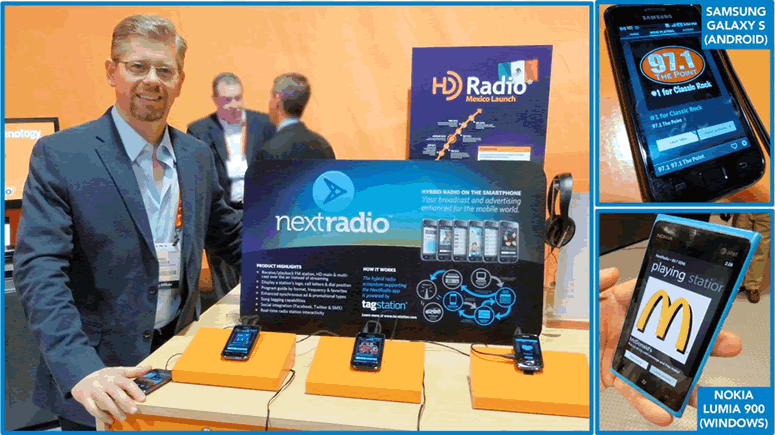
 For
vehicles without navigation, Lexus and Toyota will offer a premium
display audio system complete with free traffic maps and weather
information, all delivered by HD Radio stations across the country.
The two images at left are examples of weather and traffic displays
as they will appear in vehicles equipped with this system. The traffic
map will contain local regional traffic information and will be
updated approximately every 15 minutes.
For
vehicles without navigation, Lexus and Toyota will offer a premium
display audio system complete with free traffic maps and weather
information, all delivered by HD Radio stations across the country.
The two images at left are examples of weather and traffic displays
as they will appear in vehicles equipped with this system. The traffic
map will contain local regional traffic information and will be
updated approximately every 15 minutes.